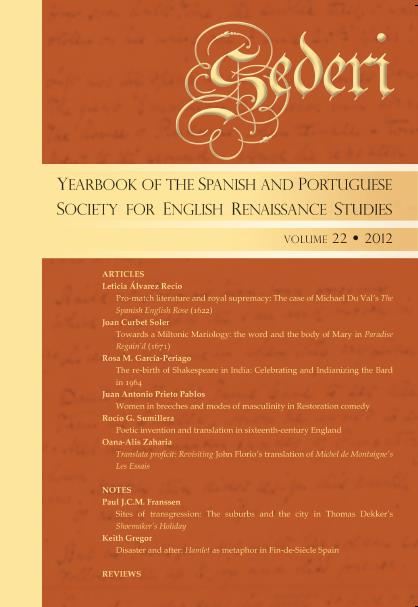Pro-match literature and royal supremacy: The case of Michael Du Val’s The Spanish English Rose (1622)
Keywords:
Spanish Match, pro-match literature, anti-match literature, political absolutism, Jacobean churchAbstract
In the years 1622-1623, at the climax of the negotiations for the Spanish-Match, King James enforced censorship on any works critical of his diplomatic policy and promoted the publication of texts that sided with his views on international relations, even though such writings may have sometimes gone beyond the propagandistic aims expected by the monarch. This is the case of Michael Du Val’s The Spanish-English Rose (1622), a political tract elaborated within court circles to promote the Anglo-Spanish alliance. This article analyzes its role in producing an alternative to the religious and imperial discourse inherited from the Elizabethan age. It also considers the intertextual relations between Du Val’s tract and other contemporary works in order to determine its part within the discursive network of the Anglican faith and political absolutism. The reasons why it may have exerted a negative influence on both the English and Spanish royal households are explored as well.
Downloads
Downloads
Published
Issue
Section
License
The copyright holder of the published contributions is SEDERI.The hardcopy and an open-access version of the journal will be published simultaneously. The issues will be available online in the SEDERI website (http://www.sederi.org/yearbook/) and other repositories that have signed an agreement with SEDERI.
The authors who publish with this journal agree to the following terms:
a) SEDERI retains copyright of the essay.
b) If the author wishes to republish or rewrite the essay for another journal, or include the essay published in SEDERI in their personal repositories, or in any other way, they should contact the editors to obtain permission to do so. This will entail citing SEDERI as the original source and sending the editors a copy of the new version, or the link to the website, in case of online publishing.
The author(s) hereby warrant(s) that:
a) The essay submitted for publication is an original creation and does not infringe any copyright or property right of another journal, author or publisher.
b) The essay submitted for publication has not been previously published, whole or in part, and is not being considered for publication elsewhere.
c) Written permission has been obtained for any material from other sources included in the essay submitted for publication.




